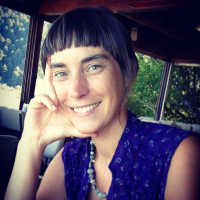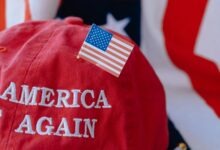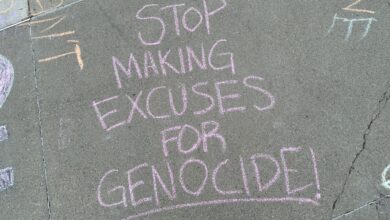
Cold War: What has to win is life
“The choice today is no longer between violence and nonviolence. It is either nonviolence or nonexistence.” - Dr. Martin Luther King, Jr.
The Cold War seemed to be over, but it has reignited again with a high risk of nuclear war. On top of that, the climate is warming as a result of our consumerist and militarist lifestyle, making the planet less inhabitable, and we only have limited time to change course.
Dr. Martin Luther King, Jr. discussed ‘three evils’: militarism, poverty, and racism. He’d probably add ‘environmental destruction’ if he were alive today as a fourth evil. We can see these evils causing harm in our world in countless ways. A place where I experienced that is the Occupied Palestinian Territory of the West Bank.
Living in the West Bank
I lived in the West Bank for three months in 2008 and nine months in 2010-11 and made some shorter visits. When I wanted to go from Bethlehem to Jerusalem, I had to cross the checkpoint like anybody else. But most Palestinians need permits to cross, and I could come and go as I pleased with my European passport. One time it was very crowded. People were pushing each other now and then to get through the metal detectors and baggage scans. I saw a soldier above us on a metal structure about seven feet high as I looked up. He had his gun pointed straight down at us. I felt panic, took a deep breath, and thought that something extreme probably needed to happen for the soldier to fire at the crowd. I shuffled forward, went through all the checks, and came out the other way.

Checkpoints are sometimes permanent structures and sometimes temporary ones. The permanent ones are at the wall built around – and also deeply inside – the West Bank. The wall separates not just Israelis and Jewish settlers from Palestinians but also Palestinians from each other, their relatives and previous neighbors, and their working place or places of religious worship. It takes land and water, slowly breaking up the territory into small pieces. Temporary checkpoints are created on the roads that connect these pieces.
The wall is an intimidating 26 feet high. I stood in front of it a few times, putting one hand to the cement and craning my head back on my neck to see its length. I felt like the whole thing crashed down on me, so heavy the weight of its injustice. In many places, paintings show different messages. One of these is etched in my heart. It showed two people hugging and the text: “These are the only arms we need.”
Protests along the wall
I’ve been part of demonstrations against this wall in places where villagers lost land and houses. At the time, these protests sometimes felt like small rituals. Palestinians and international supporters marched to the wall or fence, said some things to the Israeli soldiers, and started running when the soldiers fired tear gas. There have been a few more creative approaches, but that was mostly the procedure in different villages. When I revisited the area after four years, I was relieved to see that one village, called Bil’in, got two-thirds of its land back, as documented in the film Five Broken Cameras.
Another text I saw on the wall was: “resistance or nonexistence.” Some Palestinians still are trying to resist nonviolently. But while many factors make this conflict very hard to solve, I believe power imbalance is the main one. The USA is the main sponsor of the Israeli occupation; it sends around 3 billion USD per year of so-called ‘development’ aid to the Israeli army.
The USA has the biggest military budget in the world, with the biggest global presence at hundreds of bases on other peoples’ lands, hundreds of warships on the seas, drones operating without permission in others’ countries, and hundreds of military spacecraft in orbit. The US has established a military and economic hegemony, contributing to the gap between rich and poor.
Oppressive power; nonviolence resistance
So how is nonviolence an answer? Militarism, poverty, and racism are all features of a system of dominance or ‘power-over’. It is the idea of “the survival of the fittest,” which is the belief that we need to be stronger than others and overpower them. The zero-sum belief that we can only win if someone else loses creates the conditions for war and crushing poverty.
Nonviolent power, on the other hand, is based on collective and collaborative power, or “power-with.” It operates through skills (such as skills to organize, communicate, etc.) rather than threats, compassion rather than aggression, inner strength, and courage. Nonviolent power creates a whole different system, a very different culture. And it can come to be if more people learn about it. You can do so, for example by reading “Engaging Nonviolence, Nonviolent Change for Our Lives and Our World”, that I’ve co-authored or by playing the ‘Peace Please’ card game I’ve developed with others, if you’re looking for something a bit more laid back.
By engaging in nonviolent forms of power and acting on nonviolent values, we can reverse the four evils of our globalized world. Climate change puts extra pressure on the urgency to do so. To reverse the destruction of our planet, we need to leave the win-lose mentality behind and open our eyes to the reality that we are on this planet together. We can only continue to exist if we cooperate and help each other. The well-being of one is dependent on the well-being of all. Or as Dr. King put it: “We are caught in an inescapable network of mutuality, tied in a single garment of destiny. Whatever affects one directly affects all indirectly.”
I hope we see the choice before us in time to prevent a catastrophe. We are at a crossroads; one way has a dead end that leads to nonexistence. The other is a sharp turn away from destruction towards peace. This is the road of nonviolence. It is the only hope for our future. Just like there are no winners in war, there are no winners in global warming. What has to win is life.
Dutch author and international nonviolence trainer Nina Koevoets on the urgent need to change much of our systemic reliance on militarism and explore a collaborative future without losers.
Nina knows we are going up against the Military-Industrial Complex, which we just completed a podcast found here:






